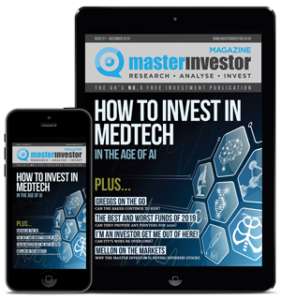Mellon on the Markets

| Master Investor Magazine
Never miss an issue of Master Investor Magazine – sign-up now for free! |
Inside the mind of the Master Investor: Influential British investor Jim Mellon reveals his latest thoughts on the markets.
Well, December was quite a month. And a good one.
The UK election went as forecast – and amazingly William Hill was offering ‘free money’ on the results, albeit in small quantities, right up to 2am, by when it was evident to anyone that there would be a Conservative landslide.
It is good that the air has been let out of the tyres on the Brexit issue, with even old stalwarts such as Michael Heseltine giving up on the Remain fight. My own sense is that the UK will do just fine, and that there will be a boom in 2020, eclipsing almost every other European economy.
Of course, the commentators are now talking about the difficulties of concluding a trade deal with the EU, but since the UK and the EU are in perfect regulatory and trade alignment right now, how difficult will a deal actually be?
Not so much, I believe, as Europe, to requote myself from a year or so ago, has a lot more to lose in trade terms than we do. The only reason that the EU hasn’t fallen into outright recession is because of the buoying effect of the large trade surplus with the UK. Simples. They need us and we will get something done.
That is why, as per my advice in the last two articles, it’s not too late to buy into UK assets. I forecast that the pound will buy US $1.40 before too long and that the FTSE has another 10% upside. To reiterate, I like Babcock (LON:BAB), Lloyds (LON:LLOY), Marston’s (LON:MARS), GSK (LON:GSK), British Land (LON:BLND), Tesco (LON:TSCO), HSBC (LON:HSBA), BP (LON:BP.), Prudential (LON:PRU), Phoenix (LON:PHNX), WPP (LON:WPP) and BT (LON:BT.A), as a conservative dividend portfolio, with most of those companies, though not all, domestically focused.
These will yield you about 5% on average and there is absolutely no need to pay a fund manager to put such a list together for you. On each of them, I would put a limit of 15% as a take profit level, and then read subsequent Master Investor commentary for what to reload, if anything.
There isn’t much to like in the US, as the CAPE (cyclically adjusted price-earnings) ratio at 26x is historically very stretched, and dividend yields low (and please here factor in the withholding tax of 15% on US dividends). But I am convinced by my chum Will Nutting, a really good commentator at Stifel, that GM (NYSE:GM), Schlumberger (NYSE:SLB) and Seadrill (NYSE:SDL) are good recovery stocks. Also, I like Gilead (NASDAQ:GILD) for its top-quality management and no doubt, ‘blockbuster’ drugs to come. It also sports a reasonable dividend yield.
Recently, the previously ludicrous amount of negative yielding bonds globally has shrunk by half, and my prediction is that there will be none of them left by the end of 2020. This means that bonds will generally fall, in line with rising inflation, which as I have said before is insidious and becoming even more so. Gilts, in the context of a more profligate government, and an attractive stock market with a remarkable dividend yield, are an obvious short, as are Bunds and Japanese government bonds.
I am not going to apologise for repeating myself again here, but anyone who has failed to load up on gold, silver, platinum or any other precious metal is bonkers. Readers will have noticed that gold is creeping up towards its recent highs, and this is a signal of two things; a different world in 2020, where return profiles will be very different, and a recognition that we are about to enter a world of inflation after more than 30 years of deflation.
This means that every investor needs to do the following: buy gold and silver or proxies; sell bonds; buy quality dividend blue-chip stocks in the UK and Japan; and divest of the tech stocks that are over-owned in the US.
The New Year period is a good one to reflect on portfolios – and as hard as possible.
In general terms, I think we should all be interested in meta thematic investment (eg clean meat, longevity and climate change) and tuck relevant investments away for the long term. In the medium term, I think it will be value destructive to carry on in the old way. Recognise that yields are going to tick up globally (note that the Swedish central Bank recently raised rates – and this will be the future norm) and that inflation is going to do the same. This will mean that you need to switch out of bonds, as detailed above – and do it soon.
If you want to buy a well-diversified miner with a decent yield, I would recommend Rio Tinto (LON:RIO). You can expect its iron-ore division to do well over the next year. Long-suffering shareholders of Condor Gold (LON:CNR)should be pleasantly surprised, I believe, as gold goes up, and gold pouring comes closer to reality.
I am writing this in a café in Ibiza, which is an island that literally seems to hibernate in the winter, so I was lucky to find this one open. We had some unwanted excitement last night as two of our dogs went missing for 13 hours, without their trackers, which meant we spent a sleepless night hoping that they would return – and avoid traffic and accidents.
They did, but it reminded me of the chaos that can sometimes blindside us as investors. However, despite occasional entropy, things generally resolve themselves (a very good and consistent observation of my wise good friend Alan Steel).
And this is how I expect it will be this next year, with the chaos taking place in a collapse in bond prices, a fall in the US dollar against most other currencies, a very sharp rise in precious metal prices and a growing recognition that the major tech giants have probably seen their best days. There will no doubt be political fracture points, for instance, in trade wars, Brexit, North Korea and Japan/Korea/China relations, but these will probably present opportunities to buy rather than a reason to sell.
In emerging markets, a falling dollar is generally good, as US-dollar debts of governments and companies become easier to service. My favourites would include Vietnam, which is garnering foreign investment at a rapid pace, as China loses its preeminent role as manufacturer to the world.
I am super-optimistic for us next year, and have been following my own advice (which I don’t always do). I really hope that some of you do too – as there will be no better sight than beaming faces and happy friends at the Master Investor show in London next March.
Happy hunting!
Jim Mellon

Comments (0)